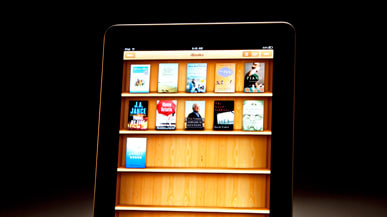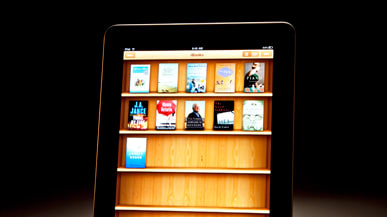Dennis Morin has spent a year of his life and about $1 million developing an e-reader application for Apple’s iPad and iPhone, devices that run Apple’s iOS mobile operating system. And now, with one little change in its rules, Apple has put him out of business, Morin says.
“It is not possible for anyone but Apple to sell e-books at a profit on iOS under these rules,” says Morin, founder and CEO of BeamItDown Software, which makes an e-book app called iFlow Reader and sells books via its own online store.

Apple’s new rules, announced yesterday, say that developers such as BeamItDown must make their products available through Apple’s own store, where Apple takes a 30 percent cut of revenues. The change will affect companies that make their content—everything from books to movies and videos to TV shows—available to owners of Apple devices.
Until now, Morin and others, like Amazon, have sidestepped Apple’s store by employing a clever workaround—when you click on a button to buy a book, you are taken out of the app to a browser, where the transaction takes place.
Morin says Apple has told him in the past that this was perfectly fine.
“The bottom line is that unless the FTC intervenes, this will put us out of business,” says one developer. “Given Apple’s political clout, this probably will not happen."
But now Apple has changed its tune. Its new policy says that booksellers can keep selling books outside the Apple store, but only if they also make the same books available inside Apple’s store as well.
Thing is, most customers will buy via Apple, because it’s more convenient. And that’s where the problem arises.
Morin says he makes less than 30 percent profit on the books he sells. So if he has to sell via Apple’s store, he will lose money on every book he sells. On a $10 book, he will lose $1.15.
“The bottom line is that unless the FTC intervenes, this will put us out of business,” Morin says. “Given Apple’s political clout, this probably will not happen. But there is no doubt that their practices are anti-competitive. We have a much better e-reader than Apple, but that is utterly irrelevant in the totalitarian world of iOS.”
Even the big guys, like Amazon and Barnes & Noble, will suffer under Apple’s new rules, Morin says. Amazon and Barnes & Noble did not respond immediately to requests for comment. Neither did Apple.
Worse yet, Morin says, Apple’s new policies will prevent small developers from dreaming up new ideas for the iPad. “This is the death of innovation in e-readers on iOS,” Morin says.
Apple’s new rules also have huge implications for companies like Netflix and Hulu, which sell movies and TV shows via subscription. Essentially, Apple is demanding a 30 percent cut of their ongoing revenues from iPads. That’s the price for making their content available to customers who own Apple devices.
There’s no sense fretting about whether or not this is fair. Apple has a right (and, indeed, an obligation, as far as its shareholders are concerned) to extract as much value as possible from the online ecosystem it has created.
The real question is whether Apple is pushing things too far. If its terms are too onerous, content partners might pull out of the Apple ecosystem, focusing their attention on other mobile device platforms, such as Google’s Android and Microsoft’s Windows Phone 7.
That too may be fine as far as Apple is concerned. It may be, in fact, that Apple would prefer to be rid of competition in books, music and video, where it already sells content. Maybe Apple hopes to create a completely closed environment, where iPad owners can only buy books from Apple’s iBookstore and rent movies from iTunes.
Blogs were buzzing yesterday with the notion that Apple may be heading toward anti-trust charges. The iPad is far and away the most popular tablet computer. But it’s probably too early to say that Apple has a monopoly.
For the government to bring a case against Apple it would first have to define tablet computers as a unique market, and then establish that Apple has a monopoly in that market and has abused its monopoly power.
That campaign could take years to wage. In the meantime, Apple will be raking in billions, and the little guys, like Morin, will be out of luck.
Dan Lyons is technology editor at Newsweek and the creator of Fake Steve Jobs, the persona behind the notorious tech blog, The Secret Diary of Steve Jobs. Before joining Newsweek, Lyons spent 10 years at Forbes.

